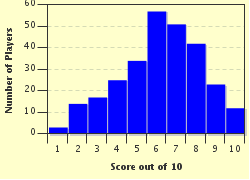Quiz Answer Key and Fun Facts
1. A friend recently described his football team's chances of winning the next day's game as being "as sure as the sun rising in the east". Does he think a victory is not possible, possible (but not likely), probable or certain?
2. If I toss three coins, how likely is it that all three land heads up? Is it not possible, possible (but not likely), probable or certain?
3. When playing Monopoly, you roll two standard dice and move the number of spaces that corresponds to the total showing on the top faces of the two dice. Is it possible (but not likely), probable, certain, or not possible that you will move more than one space in your turn (assuming you are not in Jail as you first roll)?
4. The game of Twister involves players using a spinner to determine where they must place a part of their body without falling over. There are four colors (red, yellow, blue and green), corresponding to the four colors of circles in the playing mat, and four body parts (left hand, left foot, right hand and right foot) shown on the spinner. Is it possible (but not likely), probable, certain, or not possible that a player will have to place his left foot on a purple circle?
5. As we settle down for a game of chess, my opponent will be moving first. Assuming that all possible moves are equally likely to be chosen (I do not know about this player's preferred opening strategy), is it certain, probable, possible (but not likely) or not possible that the first piece moved in the game will be a pawn?
6. When playing the game of bridge, each player is dealt thirteen cards from a deck of 52 cards. We used to play "no face, no play", meaning that if anyone received a hand that had no card higher than a ten they could call for a redeal. In an evening in which 50 hands are played, how likely was it that this would happen at least once - probable, possible (but not likely), certain or not possible?
7. We are about to fly from Melbourne, Australia (where it is summertime) to Philadelphia, PA, USA (where it is early winter) for Christmas. How likely is it that it will be colder outdoors when we land there than when we take off - certain, probable, possible (but not likely) or not possible?
8. In the card game of War, players turn over cards simultaneously, and the player with the higher card showing wins the cards. If the cards have the same value, there is a war: three cards are played face down, and the fourth turned face up to see who wins. In a two-player game, with randomly-sorted cards, is it probable, possible (but unlikely), certain or not possible that the first two cards turned over will have the same value, leading to a war?
9. While playing Scrabble (English language version), what are my chances of drawing an omega from the bag of tiles as I select the letters for my rack? Is it probable, certain, possible (but not likely) or not possible?
10. At a party attended by 30 people, how likely is it that two of them would have the same birthday (month and date, not necessarily year). Is this certain to occur, probable, possible (but not likely) or not possible?
Source: Author
looney_tunes
This quiz was reviewed by FunTrivia editor
Pagiedamon before going online.
Any errors found in FunTrivia content are routinely corrected through our feedback system.


